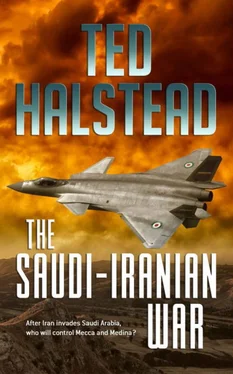Ted Halstead - The Saudi-Iranian War
Здесь есть возможность читать онлайн «Ted Halstead - The Saudi-Iranian War» весь текст электронной книги совершенно бесплатно (целиком полную версию без сокращений). В некоторых случаях можно слушать аудио, скачать через торрент в формате fb2 и присутствует краткое содержание. Год выпуска: 2019, Издательство: Independently published, Жанр: Боевая фантастика, Триллер, на английском языке. Описание произведения, (предисловие) а так же отзывы посетителей доступны на портале библиотеки ЛибКат.
- Название:The Saudi-Iranian War
- Автор:
- Издательство:Independently published
- Жанр:
- Год:2019
- ISBN:нет данных
- Рейтинг книги:4 / 5. Голосов: 1
-
Избранное:Добавить в избранное
- Отзывы:
-
Ваша оценка:
- 80
- 1
- 2
- 3
- 4
- 5
The Saudi-Iranian War: краткое содержание, описание и аннотация
Предлагаем к чтению аннотацию, описание, краткое содержание или предисловие (зависит от того, что написал сам автор книги «The Saudi-Iranian War»). Если вы не нашли необходимую информацию о книге — напишите в комментариях, мы постараемся отыскать её.
The Saudi-Iranian War — читать онлайн бесплатно полную книгу (весь текст) целиком
Ниже представлен текст книги, разбитый по страницам. Система сохранения места последней прочитанной страницы, позволяет с удобством читать онлайн бесплатно книгу «The Saudi-Iranian War», без необходимости каждый раз заново искать на чём Вы остановились. Поставьте закладку, и сможете в любой момент перейти на страницу, на которой закончили чтение.
Интервал:
Закладка:
Smyslov frowned, and pointed to Grishkov. “What is Russia’s most important export?”
Grishkov answered almost immediately, “Oil and gas.”
Smyslov nodded. “And Saudi Arabia’s?”
Grishkov’s answer was even quicker. “Oil and gas.”
Smyslov nodded again. “So, what does that give us in common?”
Grishkov looked thoughtful. “Didn’t I read that a Russian company was involved in gas exploration in Saudi Arabia?”
Vasilyev’s eyebrows flew up as rapidly as Smyslov’s.
“Excellent!” Smyslov said. “And quite right too. LukOIL signed a contract good for 40 years in 2004, suspended operations in 2016, and resumed gas exploration last year. But that’s not why this matter merits the President’s attention.”
Vasilyev nodded and said quietly, “Supply coordination.”
Smyslov nodded vigorously. “Exactly. The pact we made with the Saudis in 2018 has had its ups and downs, but it’s been successful in maintaining an oil price high enough to keep our economy in reasonable shape for years. Two of the largest petroleum exporters limiting production did what OPEC failed to do for decades — keep prices stable at a sustainable level.”
Grishkov shook his head. “So, if something happens to Saudi production wouldn’t that reduce supply further and drive prices up, giving us a windfall to spend here at home?”
Smyslov clapped his hands and grinned. “Yes, it would — for a while. And then what would happen?”
Vasilyev said quietly, “The West would ramp up production again.”
Smyslov nodded. “Just so. The Americans with their fracking. The Canadians with their tar sands. The Brazilians with their new offshore oil deposits. But this is only a secondary concern for the President.”
Vasilyev cocked his head. “The German model?”
Smyslov looked grim. “Exactly. By 2012 a quarter of Germany’s power came from renewable sources. By 2016 that had increased to nearly a third.
It’s now over half. Push the price of petroleum high enough, and even the Americans and Japanese will turn to renewables. And once the renewable infrastructure is in place, petroleum will never come back.”
Grishkov frowned. “But aren’t we supposed to be moving away from petroleum anyway? I read that we supported the Paris climate change agreement, and that there had been a change in the government’s thinking about global warming.”
Smyslov snorted. “Well, yes and no. The May 2017 storm that killed sixteen in Moscow, the worst storm to hit the capital in over one hundred years, was hard to ignore. The thawing of the permafrost supporting much of our petroleum infrastructure in Siberia, causing it to sink into a new sea of mud, also helped focus attention on the problem. However, we have so far failed to identify a candidate to replace the role petroleum serves in our economy. Right now, our only other export generating significant earnings is weapons systems. We have other possibilities, like civilian nuclear power plants and aircraft, software and other technology. But we need time to make this transition. If the terrorists are successful, events are likely to spin out of control before we have that chance.”
Grishkov looked puzzled. “You said that Iraq might be helping elements inside Iran to attack the Saudis. Don’t the Americans control Iraq? After all, it’s not so long ago that the Americans saved them after ISIS came within an hour’s drive of Baghdad.”
Smyslov nodded. “Yes, you would think that a trillion dollars and thousands of casualties would have bought the Americans at least a little Iraqi loyalty. In the real world, not so. In 2016 Iraq bought 73 T-90S and SK tanks from us, after the Americans started asking the Iraqis why some of the Abrams tanks they had provided to the Iraqi military had been given to Iranian-backed Shi’ite militia. They took delivery of the first 39 T-90S tanks in 2018, and have now fully converted to Russian armor. There are even reports of Iranian troops stationed inside Iraq, and we know that Iran has had troops stationed next door in Syria for years.”
Grishkov shrugged and spread his hands. “Fine. The Iraqis have no loyalty to the Americans. What do they have against the Saudis?”
Vasilyev grunted. “I always thought it was interesting that the Saudis waited until 2016 to reopen the embassy they had closed in 1990 after Iraq invaded Kuwait.”
Smyslov nodded. “There is little love lost in either direction. The fundamental issue is, as usual in the Middle East, religion. Iraq and Iran are majority Shi’a, in Iran’s case almost exclusively so. For some time Sunnis have been leaving Iraq, a trend that has accelerated over the past few years. That has made possible the election of increasingly radical Shi’a controlled Iraqi governments, starting with one in 2018 dominated by Shi’a cleric Moqtada al-Sadr. He was an enemy of both the Americans and Iran, but after his death other Shi’a leaders have moved closer to Iran. They all share one belief with Iran — Shi’a religious leaders should control Mecca and Medina, not the Sunnis running Saudi Arabia.”
Grishkov smiled. “So, at least we know that the attack will take place in either Mecca or Medina, or both.”
Smyslov sighed and shook his head. “No, my friend, this is the Middle East. Matters are never so direct. In fact, what our agents have learned so far suggests that the attack — or attacks — will take place in the Eastern Province, on the other side of the country.”
Grishkov scowled. “Right, you said one attack focus would be on Saudi oil production, which is mostly in the Eastern Province. But what about the other target? You said it looked like more than one. Couldn’t that be either Mecca or Medina?”
Smyslov shook his head again. “We can’t be sure of anything, but we don’t think so. Iran and Iraq would face universal condemnation in the Muslim world if an attack on either Mecca or Medina were traced back to them. More to the point, it’s hard to see how such an attack could endanger the Saudi royal family’s grip on power. It’s more likely that such an attack would make ordinary Saudis rally to their defense. Besides, our agents reported that the attackers were focused exclusively on the Eastern Province, but it appeared in more than one location.”
Vasilyev nodded. “So, where do we start?”
Chapter Three
Kazem Shirvani knew he really had no reason to complain. When the US had signed the Joint Comprehensive Plan of Action (JCPOA) ending Iran’s progress towards its rightful place as a nuclear power in 2015 it had been over Kazem’s strident objections. He had been joined by every single scientist working on Iran’s nuclear program.
It had made absolutely no difference. All Iran’s corrupt politicians cared about was money, and the sanctions levied against Iran were costing it about forty billion dollars per year in lost oil revenue. Kazem, his fellow scientists and even the few honest politicians had argued that Iran was within reach of a nuclear capability, and that just a little more time would let them take Pakistan’s path.
In 1998 Pakistan had tested its first nuclear weapon, and was promptly sanctioned by the US. The month after the 9/11 attacks the US abandoned the sanctions after it became clear Pakistani help would be necessary to remove the Taliban regime in Afghanistan. So, the sanctions against the first Muslim country to obtain nuclear weapons lasted… three years.
But the politicians eager for immediate sanctions relief pointed out that the Americans were unlikely to need Iranian help, and Iran would be unlikely to give it. Kazem and others wanting to get nuclear weapons for Iran argued that the greed of American and European countries eager for access to Iran’s market could be counted on to weaken their resolve. Besides, how long would Russia and China really go along with sanctions once their only point was to punish rather than prevent?
Читать дальшеИнтервал:
Закладка:
Похожие книги на «The Saudi-Iranian War»
Представляем Вашему вниманию похожие книги на «The Saudi-Iranian War» списком для выбора. Мы отобрали схожую по названию и смыслу литературу в надежде предоставить читателям больше вариантов отыскать новые, интересные, ещё непрочитанные произведения.
Обсуждение, отзывы о книге «The Saudi-Iranian War» и просто собственные мнения читателей. Оставьте ваши комментарии, напишите, что Вы думаете о произведении, его смысле или главных героях. Укажите что конкретно понравилось, а что нет, и почему Вы так считаете.












